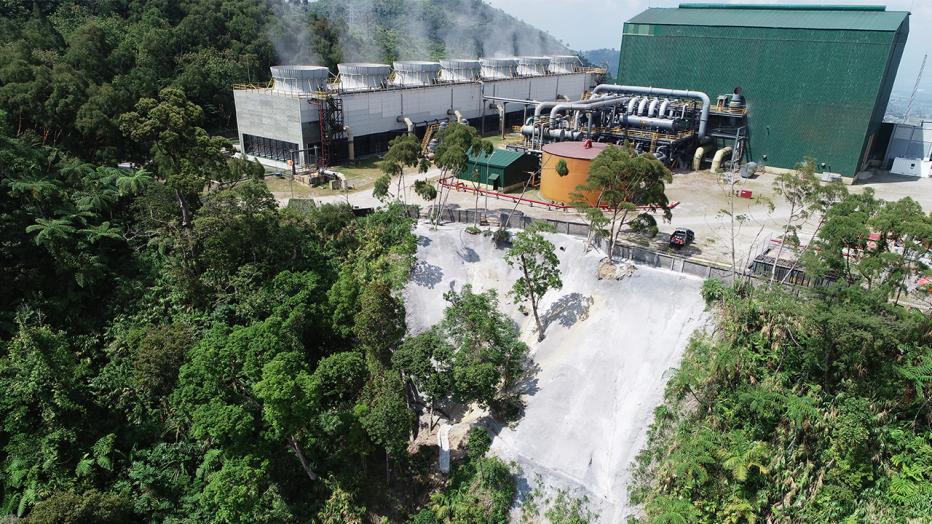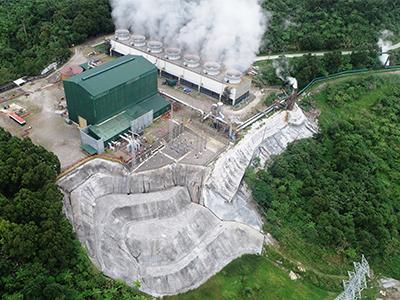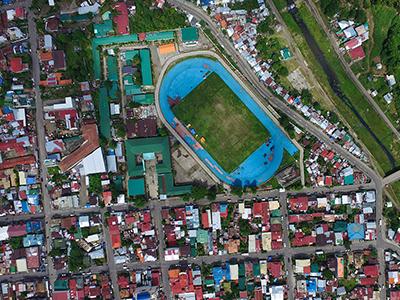
Image courtesy of Energy Development Corporation
When an earthquake measuring 6.5 on the Richter scale struck the island of Leyte in the Eastern Visayas region of the Philippines in mid-2017, it caused multiple fatalities, injuries and significant damage to critical local infrastructure. The Mahanagdong B 60 MW geothermal power plant sustained severe damage, and power supply to the whole of the Eastern Visayas region and nearby Bohol island was interrupted.
At the request of the power plant operators, Energy Development Corporation (EDC), our Power Consulting team in Asia Pacific mobilized onsite immediately to assess the extent of the damage to the plant. Our initial assessment revealed that a significant section of the retaining wall holding the plant at the top of the mountain had been damaged by a landslide and the main 220kV bay was slowly sliding down the mountain.
Once the initial condition assessment was completed, our scope of work was expanded to include an options assessment and feasibility study for remediation works, detailed electrical and geotechnical design, and project and construction management services for the remediation project. The project and construction management phase blended specialist power engineering, procurement and construction management (EPCM) experience from our Perth office, with local project engineering to provide an integrated project delivery team well-equipped to deliver the right solution for EDC.
Remote location hinders access to vital materials and equipment and challenges timeline
The remoteness of the site presented numerous challenges for the team. Located on an island, at the top of a mountain and accessible only by dirt road, just getting there was no mean feat. With limited local options available, procuring and transporting materials and equipment to site was difficult and, in some cases, impossible. For example, there was no way to get a concrete truck to site; instead the concrete was manually mixed on site by local labor.
Because of the challenges in transporting materials to site, the team repaired and recycled materials that were already on site and, where possible, sourced materials locally. This approach saved significant time during the procurement phase and contributed greatly to the overall sustainability of the remediation works.
-

Aerial views of the restored Mahanagdong B Geothermal Power Plant in Leyte, Philippines. Images courtesy of Energy Development Corporation.
-

Aerial view of Ormoc city in Leyte, Philippines.
Challenging site conditions require strong safety focus
Site conditions presented significant constructability and safety risks. During the initial site assessment stages, the team endured heavy winds, aftershocks and the risk of further earthquakes. There were also inherent risks in working close to the failed slope, stabilizing damage to the remaining section of the substation retaining wall, and in having two large workforces working in parallel to remediate the slopes while building a new substation.
Our site team implemented a strong safety culture and provided a strong guiding influence for EDC and their contractors. The design teams fully embedded Safety by Design principles into the project, helping to overcome the challenges. Ultimately, the project reported zero incident and 72,387 safe work hours, which is an outstanding achievement given the conditions.
Unique circumstances drive innovative solutions
The remote location of the power plant, the extent of the damage and the conditions under which the remediation works were to be carried out meant the team had to look beyond conventional solutions. The team delivered multiple innovations that were anything but standard practice. These included relocating the Topping Cycle generating step up transformer to the generator site and constructing a new 230kV substation; using steel poles in place of conventional landing gantry which would require large foundations; and retrofitting two damaged transmission towers while the lines were energized.
The immediate and demonstrated value of innovations delivered to EDC during the project were over $2.3 million USD.
Sustainability and resilience at the heart of the solution
Leaning on our Plan Beyond sustainability principles, the team implemented a range of sustainability measures as part of the solution. Reusing and repairing materials that were already on site helped reduce waste and minimize the overall impact of further construction works. Rather than constructing two new transmission towers, the team repaired the damaged ones. This removed the need to clear more land and retained and preserved the existing vegetation. Native vegetation was also protected and maintained through innovative geotechnical designs, enhancing slope protection for the future. Getting the plant back-on line promptly restored green geothermal energy back to the grid, minimizing the use of thermal diesel and coal generation.
Outcome
Over the course of the project, 86 people from 11 different Jacobs offices across the globe came together to resources the project. Despite multiple challenges, project delivery was fast-tracked and ultimately completed by the end of 2017, meeting EDC’s aggressive ‘return to service’ schedule.
The successful project delivery was underpinned by the positive working relationship between Jacobs and EDC, shared sustainability values, and a shared commitment to working towards a zero-carbon future through the delivery of renewable energy projects.
Since the project was completed, we’ve continued to work with EDC, delivering design and project management services for the Topping Cycle Switchyard project which was successfully completed and commissioned in 2018.
Recognition & Awards
The team overcame significant challenges and has been recognized for its work and achievements on the project by the Jacobs business, receiving both the Joseph J. Jacobs Reinventing Excellence Award – Category 2 Multiple Services and a Building, Infrastructure & Advanced Facilities (BIAF) Performance Excellence Award for 2019.
As part of the award we’re delighted to have donated $10,000 to the Keitech Foundation. The foundation teaches technical/vocational skills to underprivileged youth in the community of Kananga in Leyte, where EDC’s plant is located, opening the door to new employment opportunities and helping prepare them for a bright future.












































